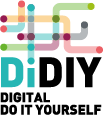Are you an educator?
 Digital Do-It-Yourself (DiDIY) in the context of education is the activity of building or customizing physical or digital objects and media contents using digital tools, empowering the pupils toward a self-paced educational experience. In the rapidly evolving society of digital age, schools, teachers and the educational system as a whole are facing an unprecedented pressure to constantly adapt and update their content and didactic modalities to meet the new needs of pupils and students.
Digital Do-It-Yourself (DiDIY) in the context of education is the activity of building or customizing physical or digital objects and media contents using digital tools, empowering the pupils toward a self-paced educational experience. In the rapidly evolving society of digital age, schools, teachers and the educational system as a whole are facing an unprecedented pressure to constantly adapt and update their content and didactic modalities to meet the new needs of pupils and students.
The DiDIY concept is gaining momentum all over Europe and worldwide as an innovative and composite answer to these needs: by combining flexible and affordable digital technologies with a project-based didactic approach, the “DiDIY education” brings pupils at the center of the learning process, enabling them to develop the necessary digital skills and, at the same time, learn “how to learn”.By approaching the DiDIY concept, teachers can get to know an innovative approach to STEM subjects. DiDIY provides a fun and engaging way to introduce primary school children and high school kids to a variety of soft skills (planning, team working, sharing, etc.) and practical activities (coding, programming, robot design, etc.).
To understand how DiDIY may help teachers to innovate their classroom and laboratory activities, you may look at the following resources:
FACTS SHEET(s) on: Introduction to DiDIY , DiDIY in education and research
VIDEOs:
- DiDIY Final Conference: Digital DIY, Education and Research (in Italian)
- Digital DIY in Education- DiDIY Community Day, Barcelona
Examples from the DiDIY POLICY PATTERNS wiki:
- Close format school teaching
- Educational systems' inertia in embracing new forms of education
- Finding resources to implement DiDIY in schools
- Lack of attention to ethical aspects in the new learning environments
- Old assessment schemes for new learning environments
- Schools cannot easily access external fablabs
- Students resistance in adopting a novel attitude towards learning
DiDIY Project Official Deliverables:
- Research space and agents
- Integration of background knowledge
- Methodological plan
- Results derived from data collection and analysis
- Strategic Plan
- Ethical issues in education and research
- Creative design and education and research
- Integrative modelling (Research and education)
- DiDIY-related education processes

